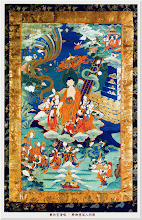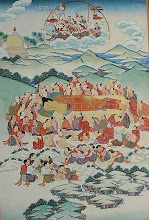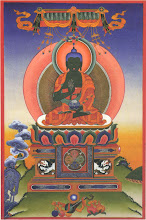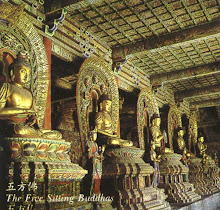Author: Shantideva Bodhisattva
(* Shantideva Bodhisattva is known as a direct disciple of Manjusri Bodhisattva)
The Key of becoming a Bodhisattva:
One who wishes to protect oneself and others quickly, should practice exchanging oneself for others, which is a great mystery.
All those who are unhappy in the world are so as a result of their desire for their own happiness.
All those who are happy in the world are so as a result of their desire for the happiness of others.
Enough of such talk!
Note the difference between the fool who seeks his own benefit, and the sage who works for the benefit of others.
One, who does not exchange his own happiness for the suffering of others, surely does not achieve Buddhahood. How could one find happiness even in the cycle of existence?
Therefore, in order to alleviate my own suffering and to alleviate the suffering of others, I give myself up to others, and I accept others as my own self.
--------------------------------------------------------------------------------
Chapter 1
Chapter 2
Chapter 3
Chapter 4
Chapter 5
Chapter 6
Chapter 7
Chapter 8
Chapter 9
Chapter 10
[In copying this ancient manuscript we discovered various translations from different traditions. The reader can be comforted to know that they all agreed with one another in substance, however, some were easier to understand in places then others. In making this text available we worked hard to ensure that it would be comprehensible. In every case we selected the verse that we felt was easiest to understand. BIONA ED.]
--------------------------------------------------------------------------------
Chapter Ten
Dedication
1. May all sentient beings be graced with the bodhisattva way of life by the virtue I have obtained while reflecting on the "A Guide To The Bodhisattva Way of Life."
2. Through my merit, may all those in all directions who are afflicted by bodily and mental sufferings, obtain oceans of joy and contentment.
3. As long as the cycle of existence lasts, may their happiness never decline. May the world attain the constant joy of the Bodhisattvas.
4. As many hells as there are in the world, may beings in them delight in the joys of contentment in Sukhavati.
5. May those afflicted with cold, find warmth. May those oppressed by heat be cooled by oceans of water springing from the great clouds of the Bodhisattvas.
6. May the forest of sword leaves become for them the splendor of a pleasure grove; and may the sword-like Salmali trees grow as wish-fulfilling trees.
7. May the regions of hell become vast ponds of delight, fragrant with lotuses, beautiful and pleasing with the cries of white geese, wild ducks, ruddy geese, and swans.
8. May the heap of burning coal become a mound of jewels. May the burning ground become a crystal marble floor; and may the mountains of "The Crushing Hell" become temples of worship filled with Sugatas.
9. May the rain of burning coal, lava, and daggers from now on become a rain of flowers; and may mutual battling with weapons now become a playful flower fight.
10. By the power of my virtue, may those whose flesh has completely fallen off, whose skeletons are of the color of a white jasmine flower, and who are immersed in the river Vaitarani whose water is like fire, attain celestial bodies and dwell with goddesses by the river Manakini.
11. May the horrifying agents of Yama, crows, and vultures suddenly watch here in fear. Those looking upward behold blazing Vajrapani in the sky wonder: "Whose is this brilliant light that dispels darkness all around and generates the joy of contentment?" May they depart together with him, freed of vice through the power of their joy.
12. A rain of Lotuses falls mixed with fragrant waters. It is seen to extinguish the unceasing fires of the hells. May the beings of the hells, suddenly refreshed with joy, wonder, "What is this?" and may they see Padmapani.
13. Friends, come quickly! Cast away fear! We are alive! A radiant vanquisher of fear, a certain prince in a monastic robe, has come to us. By his power every adversity is removed, streams of delight flow, the Spirit of Awakening is born, as is compassion, the mother of protection of all beings.
14. Behold him whose Lotus-Feet are worshipped with tiaras of hundreds of gods, whose eyes are moist with compassion, on whose head a stream of diverse flowers rains down, with his delightful summer palaces celebrated by thousands of goddesses singing hymns of praise. Upon seeing Manjughosa before them, may the beings of the hells immediately cheer.
15. Through my virtues, may the beings of the hells rejoice upon seeing the un-obscured clouds of Bodhisattvas, headed by Samantabhadra and bearing pleasant, cool, and fragrant rains and breezes.
16. May the intense pains and fears of the beings of the hells be pacified. May the inhabitants of all miserable states of existence be liberated from their woeful states.
17. May the animal's risk of being eaten by each other disappear! May the Pretas be as happy as the people in Uttarakura!
18. May the Pretas always be satiated, bathed, and refreshed by streams of milk pouring from the hand of noble Avalokiteshvara.
19. May the blind always see forms, and may the deaf hear. May pregnant women give birth without pains, as did Mayadevi.
20. May they acquire everything that is beneficial and desired by the mind: clothing, food, drink, flower garlands, sandalwood-paste, and ornaments.
21. May the fearful become fearless and those struck with grief find joy. May the despondent become resolute and free of trepidation.
22. May the ill have good health. May they be freed from every bondage. May the weak become strong and have affectionate hearts for one another.
23. May all regions be advantageous to all those who travel on roads. May the purpose for which they set out be expediently accomplished.
24. May those who journey by boat succeed, as they desire. May they safely reach the shore and rejoice with their relatives.
25. May those who find themselves on wrong paths in dreary forests come upon the company of fellow travelers; and without fatigue, may they journey without fear of bandits, tigers, and the like.
26. May deities protect the dull, the insane, the deranged, the helpless, the young, and the elderly, and those in danger from sickness, the wilderness, and so on.
27. May they be free from all lack of leisure; may they be endowed with faith, wisdom, and compassion; may they be possessed of stature and good conduct; and may they always remember their former lives.
28. May they be inexhaustible treasuries just like Sky Treasure. Free of conflict or irritation, may they have an independent way of life.
29. May beings who have little splendor be endowed with great magnificence. May unattractive wretched be endowed with great beauty.
30. May the women in the world become men. May the lowly obtain grandeur and yet be free of arrogance.
31. Through this merit of mine, may all beings without exception abstain from every vice and always engage in virtue.
32. Not lacking the Spirit of Awakening, devoted to the Bodhisattva way of life, embraced by the Buddhas, and free of the deeds of Maras,
33. May all beings have immeasurable life spans. May they always live happily, and may even the word death disappear.
34. May all quarters of the world be delightful with gardens of wish fulfilling trees, filled with the Buddhas and the Children of the Buddhas, and be enchanting with the sound of Dharma.
35. May the ground everywhere be free from stones and rocks, smooth like the palm of the hand, soft, and made of Lapis Lazuli.
36. May the great assemblages of Bodhisattvas sit on all sides. May they beautify the earth with their own resplendence.
37. May all beings unceasingly hear the sound of Dharma from the birds, from every tree, from the rays of light, and from the sky.
38. May they always encounter the Buddhas and the Children of the Buddhas. May they worship the Spiritual Mentor of the world with endless clouds of offerings.
39. May a god send rain in time, and may there be an abundance of crops. May the populace be prosperous, and may the king be righteous.
40. May medicines be effective, and may the mantras of those who recite them be successful. May Dakinis, Rakasas, and other ghouls be filled with compassion.
41. May no sentient being be unhappy, sinful, ill, neglected, or despised; and may no one be despondent.
42. May monasteries be well established, full of chanting and study. May there always be harmony among the Sangha, and may the purpose of the Sangha be accomplished.
43. May monks who wish to practice find solitude. May they meditate with their minds agile and free of all distractions.
44. May nuns receive provisions and be free of quarrels and troubles. May all renunciations be of untarnished ethical discipline.
45. May those who are of poor ethical discipline be disgusted and become constantly intent on the extinction of their vices. May they reach a fortunate state of existence, and may their vows remain unbroken there.
46. May they be learned and cultured, receive alms, and have provisions. May their mind streams be pure and their fame be proclaimed in every direction.
47. Without experiencing the suffering of the miserable states of existence and without arduous practice, may the world attain Buddhahood in a single divine body.
48. May all sentient beings worship all the Buddhas in many ways. May they be exceedingly joyful with the inconceivable bliss of the Buddhas.
49. May the Bodhisattvas' wishes for the welfare of the world be fulfilled; and whatever the protectors intend for sentient beings, may that be accomplished.
50. May the Pratyekabuddhas and Sravakas be happy, always worshipped by the lofty gods, asuras, and humans.
51. Through the grace of Manjughosa, may I always achieve ordination and the recollection of the past lives until I reach the Joyous Ground.
52. May I live endowed with strength in whatever posture I am. In all my lives may I find plentiful places of solitude.
53. When I wish to see or ask something, may I see the Protector Manjunatha himself, without any impediment.
54. May my way of life be life be like that of Manjusri, who lives to accomplish the benefit of all sentient beings throughout the ten directions.
55. For as long as space endures and for as long as the world lasts, may I live dispelling the miseries of the world.
56. Whatever suffering there is for the world, may it all ripen upon me. May the world find happiness through all the virtues of the Bodhisattvas.
57. May teaching that is the sole medicine for the suffering of the world and the source of all prosperity and joy remain for a long time, accompanied by riches and honor!
58. I bow to Manjughosa, through whose grace my mind turns to virtue. I salute my spiritual friend through whose kindness it becomes stronger.
[End of Text]
--------------------------------------------------------------------------------


























.jpg)














